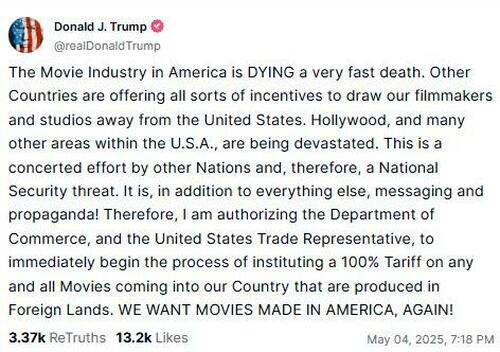Think Trump's tariffs are only for products, think again. On Sunday evening, President Donald Trump announced that he plans to impose a 100% tariff on films produced overseas, extending his restrictive trade policies on US imports to the entertainment sector for the first time.
In a post on Truth Social, the American leader said he was directing the Commerce Department and his trade representative to “immediately begin the process of instituting” the levy on foreign movies. “WE WANT MOVIES MADE IN AMERICA, AGAIN!” Trump continued.
Films made by American studios are often shot in the United Kingdom and Canada, including this year’s highest-grossing film, “A Minecraft Movie.” Some of summer’s biggest productions including “Mission: Impossible – The Final Reckoning” and “Jurassic World Rebirth” were also made primarily or entirely outside the U.S.
As Bloomberg notes, it was not clear how such a tariff would work, nor how foreign movies would be valued for tariff collection purposes. Many films from Hollywood studios involve global production, including shooting locations in foreign countries and post-production work that can be done anywhere in the world.
As WSJ notes, Hollywood studio executives - were given no prior warning about the tariff plan and no information about how it might work - scrambled Sunday night to determine what the announcement would mean for their business.
If other countries imposed reciprocal tariffs, it could devastate Hollywood studios, since most big-budget event films earn the majority of their revenue overseas, and especially China.
“We’re on it,” U.S. Commerce Secretary Howard Lutnick posted on X on Sunday.
It is unclear how such a tariff would work because movies aren’t physical goods that move through ports like most items subject to tariffs. The Trump administration would need to determine how to value a movie in order to apply the tariffs, as well as what the threshold would be to classify it as an import.
The action may be a retaliation for China's decision last month to “moderately reduce” the number of Hollywood films allowed in the country, which in turn was retaliation for Trump’s aggressive tariffs. The China Film Administration said in April that the restrictions would “inevitably further reduce the domestic audience’s favorability toward American films”, an outcome which Trump - who has a very unfavorable view of Hollywood himself - seems to appreciate at the time.
While the US film industry is the most influential in the world, foreign films have seen a rise in popularity in recent years, drawing award-winning acclaim. The South-Korean thriller Parasite, for instance, won four Academy Awards, including the coveted Best Picture category in 2020. The film and TV industry supported some 2.3 million jobs in the US in 2023, according to the Motion Picture Association trade group. The association didn’t respond to a request for comment on Trump’s tariffs made outside of regular working hours.
London in particular has become a thriving hub for Hollywood productions, because of its tax incentives, extensive infrastructure including large soundstages, and English-speaking crews. Disney’s Marvel Studios is shooting a pair of upcoming Avengers sequels there.
Film and TV work in the US has contracted in recent years for a number of reasons. Media companies have cut back on spending in an attempt to boost their profits as they shifted from traditional TV to streaming services. Those streaming services are expanding globally and looking to produce more films for foreign markets.
Spending on film and TV production in the US fell 28% between 2021 and 2024, according to data from the research firm ProdPro, although a large part of that has to do with the backlash among normal Americans against Hollywood's fake wokeness. Meanwhile, pther countries, such as Canada, Australia, and the UK, are seeing an increase in film and TV production, due in part to attractive tax incentives and lower production costs.
Movie and TV filming in the greater Los Angeles area declined 22% in the first quarter, reflecting California’s continued loss of business to other areas.
In January, Trump appointed actors Mel Gibson, Jon Voight and Sylvester Stallone to be special ambassadors to Hollywood with the goal of boosting US jobs. Voight is expected to introduce some ideas shortly, including incentives for businesses.
“These three very talented people will be my eyes and ears, and I will get done what they suggest,” he said.
It wasn't immediately clear which companies would be hurt the most from Trump's decision, however names such as Netflix will likely be closely scrutinized as a growing number of movies made by the world's largest streaming service are now produced offshore to lower costs.
Netflix has been the best performing megatech names (a founding member of the now defunct FAANG acronym), although a sharp spike in production costs could results in a sizable drop in the stock.
Loading...
